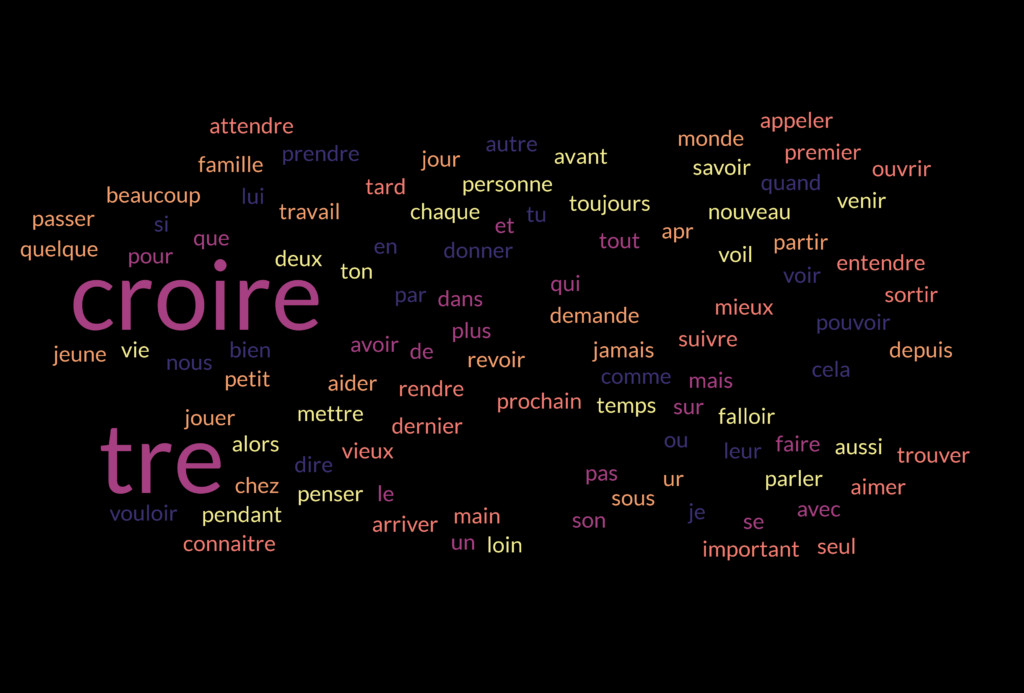How Many Words Are in the French Language?

When it comes to learning French, there are suggestions aplenty for acquiring vocabulary. You’re probably bombarded with a ton of vocabulary already.
But which words do you actually need to know? How many words do you really need to communicate effectively in French? To be “proficient” in French it’s around 5,000 words, but the answer is very nuanced, as we’re about to see.
Download: This blog post is available as a convenient and portable PDF that you can take anywhere. Click here to get a copy. (Download)
What Constitutes a Word?
Before we talk about how many words the French language has, we should try to unpack what a “word” is first. It seems like a simple enough concept, but in a language learning context where you’re aiming to learn a certain number of words to become fluent in your target language, things get a bit tricky.
See, one problem that learners of French (or languages in general) encounter is that the definition of a “word” varies. This makes it hard to quantify how many words a learner already knows versus how many words they should know in a language.
On one hand, a word can be seen as a distinct unit that has its own spelling and/or pronunciation. For example, take the words fille (girl) and filles (girls) in French. These could be regarded as separate words because, even though they’re pronounced the same, they have different meanings and are spelled differently.
On the other hand, these two words are actually from the same “root” word and in the same “word family.” In other words, filles (girls) is just a variant (in this case, the plural form) of fille (girl). Both instances simply constitute two variants of the same word. It’s easier to learn “roots” or “word families,” especially in the case of nouns, adjectives and verbs where one “word” may have dozens of variants such as verb conjugations, plurals and gender agreements.
French further complicates word counting because one word may have multiple meanings. For example, personne can mean both “person” and “no one.”
For our purposes, we’re going to say that variants constitute the same root word and that a word can have multiple meanings. In other words, when figuring out word goals, learners should count a word and all its variants as a single word.
How Many Words in the French Language Should You Learn?
Now that we’ve decided what constitutes a word, we need to figure out how many words a French learner should know to get by in everyday French conversations. To do that, let’s look at some statistics about the French language—starting with the French dictionary Larousse, which is often considered one of the best (if not the best) in the language.
According to Larousse, the French language has approximately 135,000 words—but you don’t have to know all of them. In fact, one BBC article says that native speakers usually know 15,000 to 20,000 lemmas (i.e., word variants) of their first language.
So, what does all this mean? Well, first of all, you don’t need to learn all the words in the French language—even native French speakers don’t know them all.
You don’t even have to know 20,000 words, either. Given that a big part of those 15,000–20,000 words are vocabulary that speakers don’t use in day-to-day speech (a.k.a. passive vocabulary), French learners should focus on growing their active vocabulary (the words that you can recall easily when speaking or writing). And that’s the good news!
According to the BBC article I cited above, if you know the most common 800 to 1,000 word variants in your target language, you can already understand at least 75 percent of that language as it’s used by native speakers. And if you want to understand spoken French through media like films or TV, you should know at least 3,000 common word variants. For those who want to take it further and read French works like books and news articles, your target should go up to between 8,000 and 9,000 lemmas.
If 9,000 word variants sounds intimidating, keep in mind that the spike in the numbers is largely due to the fact that many writers tend to use words you’d normally not use in real life. (I know I’ve had to look up words that I read in an English novel now and then!)
Therefore, applying the law of averages, to be “proficient” in French, you should have around 5,000 words in your active vocabulary.
Getting to 5,000 Words of Active Vocabulary
Reaching a vocabulary of 5,000 words can still be a daunting task. But never fear! A step-by-step process is here.
When growing your vocabulary, you should learn new words strategically.
Aim to learn the most common words in the language. You can do this by consulting some of the frequency lists included below. A frequency list is a collection of words that compiles the most common words by how often they are used. I also suggest using topic-specific vocabulary lists to learn vocabulary catered to your specific learner’s needs.
Remember, a good active vocabulary consists of the most useful words for your purpose. There’s no sense in learning the French word for “limited liability partnership” if you’re not likely to be in a situation where you’d need to say it. If you’re planning to work for a French accounting firm or financial institution, on the other hand, you’d definitely need to brush up on your business French.
Your First 1,000 Words
Your first 1,000 acquired words should focus on the most common, everyday words and expressions in the French language. This includes knowing articles such as “the” and “a” (as well as their rules and usage), greetings and common vocabulary from everyday topics such as food, colors, the household, travel, etc.
You should also aim to familiarize yourself with grammar during this stage of vocabulary acquisition. Remember, you want to learn these words in context. Learning the word table (table) without knowing that it’s feminine and takes the articles la (the) and une (a) will only cause problems later down the road.
For specific vocabulary lists on common topics, I suggest you check out the following:
- Ielanguages French: This website has some of the most common vocabulary and grammar constructions in French sorted into topics and tutorials. It also has one of the best lists to consult if you’re a beginner and have no previous knowledge of French.
- 101Languages: 101Languages has compiled a list of the most common 1,000 words used in French. This list can be downloaded for easy access on your computer, tablet or phone. It includes variants as separate words so it would be most useful to learn each word in the context of their examples. The top 100 words have audio files for pronunciation help.
- Memrise: Memrise has a frequency list of the most common 5,000 words in French, which is ideal for learners. This list doesn’t include variants, so learners should know enough about grammar to know how a word functions in a multitude of contexts such as verb conjugations, gender, plural agreement rules and more.
Reaching 2,500 Words
By the halfway point to a strong active vocabulary, learners should have moved away from the most common French words. Instead, now is the time to learn vocabulary that will allow the learner to achieve their goals with the French language.
Do you plan to shop in a Francophone community? Learn shopping vocabulary. Do you plan to work? Focus on business French. Want to live in France permanently? Study informal French so you’ll have an easier time interacting with and making friends with the locals.
Learners should also be actively accessing French media and recording unknown words they come across. By doing this, learners can experience French “in the wild.” Remember that the French language isn’t confined to a word list: it’s an ever-changing language. Try following French news or listening to French music to see French in its natural environment.
Another top tip is to start expanding your knowledge of conjunctions (also known as transition words). This step will help you piece together words more fluently and add a higher fluidity to your usage of your French vocabulary.
For some top tips on how to achieve this, check out the video below.
An Active Vocabulary of 5,000 Words
With a 5,000-word active vocabulary, learners should be able to understand and use more and more French every day. Better yet, since you’ve probably come across a lot of French words at this point, you should have a considerable passive vocabulary as well—which should be much larger than 5,000 words.
Like with 2,500 words, learners should use the last stretch to further specialize their vocabulary. This doesn’t mean a learner should ignore common, everyday words. But again, focusing on goals can lead you toward the appropriate direction.
Learners should work with advanced vocabulary lists. Luckily, Wiktionary has a collection of advanced frequency word lists—some even reaching 50,000 words (which include word variants, by the way). Who said you have to stop at 5,000 words? The sky’s the limit!
Well, the limit is actually 135,000 words, but I wouldn’t be worried about exhausting all those words any time soon.
Why Vocabulary Size Matters
Being aware of how many words you need to know in your target language is a real concern for learners like you.
While aiming to know a certain number of words shouldn’t be the only goal when learning French, it’s useful to know how many words are needed to be “proficient” or “fluent” in the language.
Instead of focusing on just a number, your goal should be to learn a certain number of words alongside grammatical rules for using said words in everyday situations. Because of this, it’s best to learn vocabulary in context. This means learning vocabulary from authentic materials—i.e., materials that native French speakers actually use and consume. This way, you’re not learning vocabulary in a vacuum: you get a pretty good idea of how natives actually use those words.
Finally, learners should aim to grow their active vocabulary. Having a large active vocabulary allows you to express yourself accurately and concisely in most situations.
So get your device or your flashcards ready. A bountiful active French vocabulary is within your reach!
Download: This blog post is available as a convenient and portable PDF that you can take anywhere. Click here to get a copy. (Download)
And One More Thing...
If you like learning French at your own pace and from the comfort of your device, I have to tell you about FluentU.
FluentU makes it easier (and way more fun) to learn French by making real content like movies and series accessible to learners. You can check out FluentU's curated video library, or bring our learning tools directly to Netflix or YouTube with the FluentU Chrome extension.
One of the features I find most helpful is the interactive captions—you can tap on any word to see its meaning, an image, pronunciation, and other examples from different contexts. It’s a great way to pick up French vocab without having to pause and look things up separately.
FluentU also helps reinforce what you’ve learned with personalized quizzes. You can swipe through extra examples and complete engaging exercises that adapt to your progress. You'll get extra practice with the words you find more challenging and even be reminded you when it’s time to review!
You can use FluentU on your computer, tablet, or phone with our app for Apple or Android devices. Click here to take advantage of our current sale! (Expires at the end of this month.)










